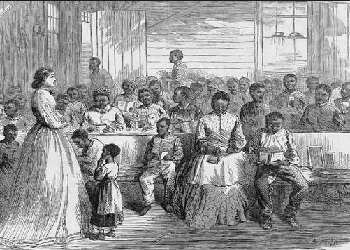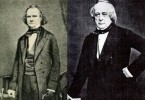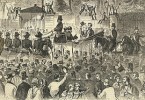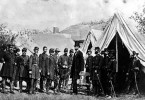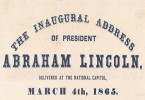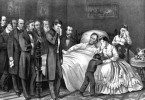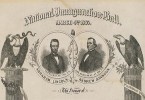Transition to Reconstruction
Efforts of reconstruction started before the war was over. In his 1863 address to Congress the president announced a Proclamation of Amnesty and Reconstruction. Lincoln offered “full pardon with restoration of all rights of property, except as to slaves” to all rebels, except high ranking Confederate officials, who had pledged to obey acts of congress relating to slavery. This measure was necessary to prevent any attempts at re enslaving freedmen. Southerners must accept emancipation as a condition for reconstruction and state governments can be set up representing 10% of the votes.
Even thought the war continued, transition from war to Reconstruction started by asserting power in Confederate lands by setting appointed military governors and replacing existing Confederate governments. Local elections took place when civilian rule was established. Military authority preserved order and peace.
The National banking system was created with the National Banking Act signed in 1863. It created a standardized currency backed by holdings of US Treasury with the purpose of financing the Civil War and the reconstruction process.
The Vetoed Wade-Davis Bill
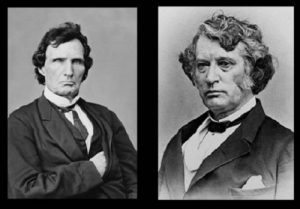
The Wade Davis Bill passed both houses of Congress on July 2, 1864, but was vetoed by President Lincoln and never took effect. Lincoln did not sign the bill because he wanted to mend the Union by carrying out the Ten percent plan.
Congress passed the Wade-Davis bill which asserted congressional control over the reconstruction process as opposed to executive control by the president. The bill required complete abolition of slavery in the reorganization of any southern state. Instead of the president’s condition of 10%, the bill required that 50% of 1860 voters must participate in the election of their governments. Electors of constitutional conventions in Southern states had to give an oath of loyalty that they have never voluntarily borne arms against the United States or helped the rebellion. The bill would not allow the recognition of the new government of Louisiana which had been organized with 10% of the voters. Lincoln pocket-vetoed the bill.
The reconstruction questions were: What will happen to the South after the war? What would be the status of black laborers and their civil rights protection? What would happen to the political and economic power of southern planters?
Lincoln had already vetoed the Wade-Davis bill and was ready to do it again if the bill did not recognize the new free government of Louisiana elected with 10% of the voters. Representative Ashley introduced a new bill trying to include compromises from all sides but failed to attract a majority. This defeat left reconstruction efforts back in the hands of the executive as Lincoln desired.
The 13th Constitutional Amendment
President Lincoln pleaded the house to approve his constitutional amendment to abolish slavery in the country, which failed to pass in the previous session. This time, about two thirds of House members voted for the 13th Amendment. The president signed it on February 1, 1864, it was passed by the Senate on April 8 and the House on January 1st, 1865. But before the 13th Amendment could go into effect it had to be recognized by 27 of the 36 states.
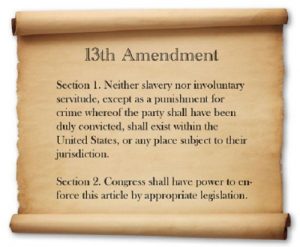
The 13th Amendment was passed by the Senate on April 8, 1864, and by the House on January 31, 1865. It was the first of the three Reconstruction Amendments adopted following the American Civil War.
Only slaves in rebellious states were declared free in January 1863 by the Emancipation Proclamation and their post war status was unclear. The 13th Amendment formally abolished slavery throughout the United States. It was the first of three Reconstruction amendments to the U.S. Constitution.
After Lincoln’s assassination the Reconstruction process continued under Andrew Johnson. The 14th Amendment was proposed in 1866 and ratified in 1868. It guaranteed United States citizenship to all persons born or naturalized in the United States and granted them civil rights. The 15th Amendment was proposed in 1869 and ratified in 1870. It stated that the right to vote could not be denied because of race, color or previous condition of servitude.
Freedmen
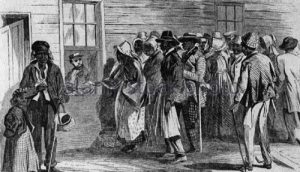
The Freedmen’s Bureau was formally known as the Bureau of Refugees, Freedmen and Abandoned Lands. It was established in 1865 to provide food, housing and medical aid to former slaves. It established schools and offered legal assistance. It also attempted to settle former slaves on land confiscated or abandoned during the war.
After the war was over Republicans came to power in almost all southern states. They established the Freedmen’s Bureau to protect the legal rights of freedmen, provide education, churches and negotiate labor contracts. The purpose was to transform society. Many northerners came to the south, they were known as “carpetbaggers”. Many were businessmen and politicians; others were teachers and missionaries. Providing freedman the opportunity of education and training would enfranchise them and give them the power to strive in society. But for many the only way to protect African Americans was to give them the right to suffrage which would not come until 1870.

